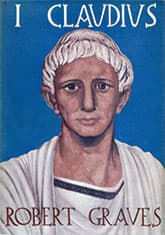I, Claudius
CRITIQUE
 First edition
First editionFirst publication
1934
Literature form
Novel
Genres
Literary, historical fiction
Writing language
English
Author's country
england
Length
Approx. 152,000 words
First line
I, Tiberius Claudius Drusus Nero Germanicus This-that-and-the-other (for I shall not trouble you yet with all my titles), who was once, and not so long ago, known to my friends and relatives and associates as "Claudius the Idiot", or "That Claudius", or Claudius the Stammerer", or Clau-Clau-Claudius", or at best as "Poor Uncle Claudius", am now about to write this strange history of my life....
Great lines
She had scarcely spoken it before the cat sprang on her, seized her, and swallowed her down. You see, that is the way of the world.
"The Cat and Mouse in Partnership"
Last lines
On the way, the doves picked out one eye from each of them. When returning, they changed places, and the doves picked out the other eye of each, so they were for their wickedness and falsehood both punished with blindness during the rest of their lives.
"Cinderella"
Claudius the hero
There are some writers who are not really good novelists—who don't seem to have the artistic talents to shape words, sentences and paragraphs into conventional novelistic form—and yet who have the ability to recognize a great story and the rudimentary skills to marshal the material into an order that engages readers' interest. And thus produce what come to known as great novels.
Such a writer is Robert Graves in his Roman Empire books I, Claudius and Claudius the God. Another might be Thomas Kenneally in Schindler's List. They tend to be historical novelists, finding their narratives in well-researched actual events.
This is not to denigrate the achievement. I, Claudius is sensational.
Despite its long paragraphs of exposition, its numerous and confusing characters, and its lengthy subplots—often involving military expeditions far from the direct experience of its narrator and central character—the novel absorbs the reader into the life of the early Roman Empire, as seen from within the ruling family.
Frankly, it is difficult to know how the trick is done.
The research is voluminous and Graves has a knack for picking up on the one detail out of thousands in any part of the story to bring it to life for a modern reader. But this is not particularly unusual for historical writers.
We also have the thrill of getting the inside scoop on how the mighty and divine really live: their loves, their betrayals, their frailties, their hushed-up scandals. But again this is standard fare.
Claudius is in many ways an attractive narrator, portrayed sympathetically as the gentlest and most learned of a rather brutal lot. But this still leaves him an arrogant, imperialist, superstitious and ruthless bastard, compared to most people in the world. And Graves is to be admired for not soft-peddling this side of Claudius. The narrator never breaks character to pander to modern morality.
Claudius is also the underdog, scorned as a stuttering imbecile, while we the readers know his hidden talents, and this may appeal to us, none of us feeling we are properly recognized, I'm sure. His serendipitous victory—first of all in just surviving while all his persecutors and peers fall and then in gaining the most revered position of all—this has got to be wish fulfilment for many of us.
My guess is that this is what drives us through I, Claudius. And what explains the slight falling off of interest in Claudius the God, the follow-up in which our underdog is the overlord. In the sequel Graves plays up how Claudius's rule over Rome was undermined by false friends, a duplicitous wife, a cowardly Senate and a selfish citizenry. But it's hard to feel sorry for him or to expect anything better at this point. A long side trip into Middle Eastern politics, touching on nascent Christianity, is also a distraction.
The second book also suffers from not having a villain of the stature of Livia, Emperor Augustus's scheming wife and de facto ruler of the empire during the reigns of both her husband and his successor, Tiberius, her son. In I, Claudius, she's evil incarnate, poisoning everyone who stands in her way, but we—like Claudius who suffers miserably under her thumb—come to admire her skill in getting what she considers best for Rome and herself. A spark goes out of the novel when she dies. Claudius' next antagonist, Caligula who comes to power after murdering Tiberius, is cartoonishly evil in his bloodthirstiness and insanity. And in the second novel when Claudius takes over, his wife Messalina, working behind the scenes, is a pale imitation of Livia, a mere wanton, an amateur.
The world may love a hero, but never so much as when he's got a great villain to support him.
You've got to read the second book because it continues the story of the first—together they make up one life-story that would be incomplete if either were left alone—but it's really I, Claudius that rules.
— Eric
CRITIQUE


